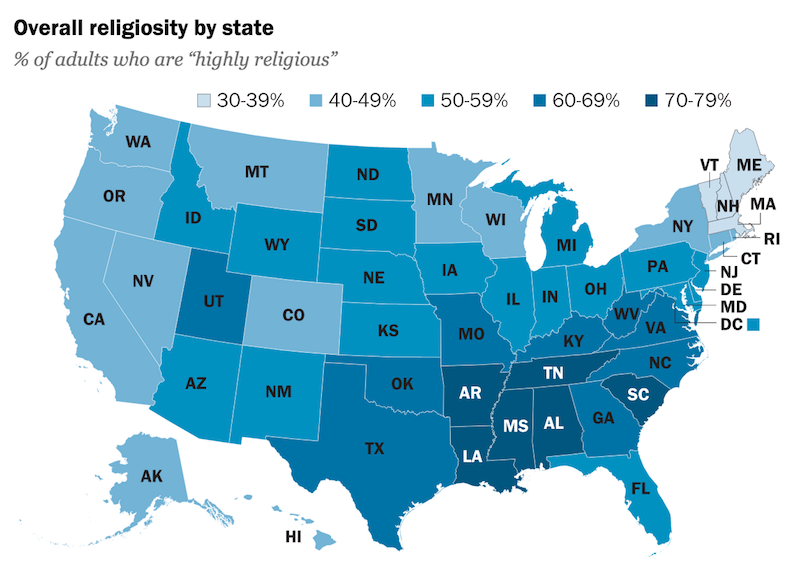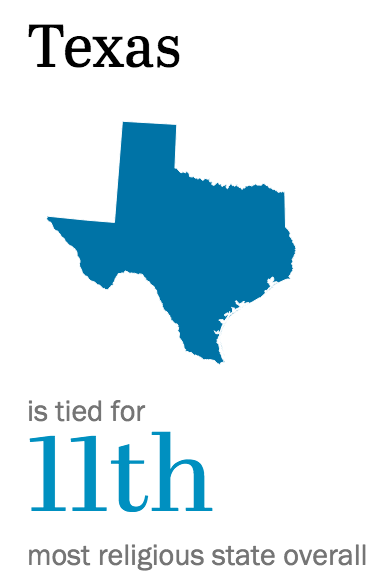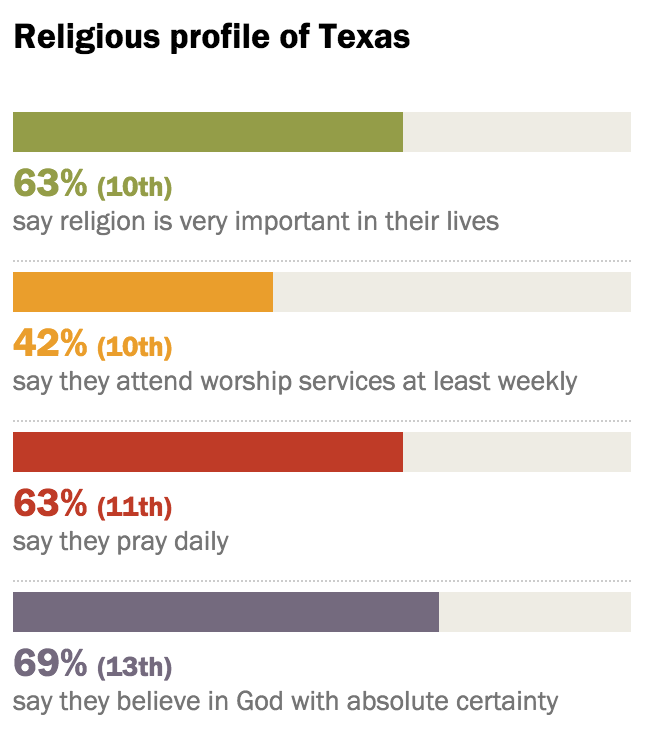Editorial: The problem with being ‘highly religious’
So much for “buckle of the Bible Belt.” That’s how Texans often describe our state. We tend to think of ourselves as the most overtly religious of the Southern states, which comprise the most overtly religious region in the nation.
 Pew Research CenterBut that’s not accurate, according to a new report—“How religious is your state?”—from the Pew Research Center.
Pew Research CenterBut that’s not accurate, according to a new report—“How religious is your state?”—from the Pew Research Center.
Texas tied for 11th with—gasp!—Mormon Utah. According to the Pew Center, 64 percent of adult Texans qualify as “highly religious.” The Lone Star State fell 13 points behind the Bible Belt’s co-buckles, Alabama and Mississippi. Maybe drawling makes people more religious, because 77 percent of the residents of those Deep South states are “highly religious.”
In fact, nine of the Top 10 “highly religious” states lie in Dixie. The lone exception is our northern neighbor, No. 8 Oklahoma. The Southern outlier is No. 22, Florida. But the Sunshine State’s pretty beaches and blue skies have attracted a cosmopolitan population, so it doesn’t really fit the regional demographic.
True to stereotype, the “least religious” states are in New England
Are you “highly religious”?
 Pew Research CenterYou may be wondering whether you, too, qualify as “highly religious.”
Pew Research CenterYou may be wondering whether you, too, qualify as “highly religious.”
According to the Pew Center, the term applies to “any adult who reports at least two of four highly observant behaviors … while not reporting a low level of religious observance in any of these areas”:
- Attending religious services at least weekly.
- Praying at least weekly.
- Believing in God with absolute certainty.
- Saying religion is very important personally.
Pew also defines as “highly religious” people who report three of the behaviors and a low level on only the fourth.
Breaking down the numbers
 Pew Research CenterWhile Texans tied for 11th overall in the “highly religious” rankings, here are the state’s rankings for the four components of the survey:
Pew Research CenterWhile Texans tied for 11th overall in the “highly religious” rankings, here are the state’s rankings for the four components of the survey:
- 63 percent (10th overall) say religion is very important in their lives.
- 42 percent (also 10th) say they attend worship services weekly.
- 63 percent (11th) say they pray daily.
- 69 percent (13th) say they believe in God with absolute certainty.
Those numbers compare with Utah:
- 58 percent (15th) say religion is very important in their lives.
- 53 percent (1st) say they attend worship services weekly.
- 61 percent (13th) say they pray daily.
- 61 percent (31st) say they believe in God with absolute certainty.
Ironic, isn’t it?
Although they sit next to each other in the alphabetical listing of these United States, most folks would say, religiously speaking, Texas and Utah are quite different. Baptists and Catholics dominate Texas, but the Church of Jesus Christ of Latter-Day Saints—Mormons—is dominant in the Beehive State.
With all due respect to the Pew Religion Center—a revered and tremendously beneficial organization—the difference between Texas and Utah points to the problem of ranking states, or people, or churches, or any other group, for that matter, by how “religious” they are. Texas and Utah are conservative politically, but they’re poles apart in what they believe about Jesus, and God, for that matter.
So, saying a state—or, more importantly, a person—is “highly religious” is problematic, to say the least. We can feel good about going to church, thinking religion is important, praying and believing in God. But we know people who can check all those boxes, and yet they are mean, prejudiced, greedy, judgmental, hypocritical, vindictive and angry. They may be “highly religious,” but their behavior drives other people away from Jesus.
What about “highly faithful”?
The Pew Center may not be able to register it, but what this country and world need are people who are “highly faithful.” For Christians, they would be people who closely follow what Jesus stressed is important for his followers.
According to his inaugural sermon in the fourth chapter of the Gospel of Luke, they would:
- Proclaim good news to the poor.
- Declare freedom for the prisoners.
- Help the blind recover sight.
- Set the oppressed free.
- Proclaim “the year of the Lord’s favor.”
And according to what Jesus taught in the 25th chapter of the Gospel of Matthew, they would:
- Feed the hungry.
- Give drink to the thirsty.
- Shelter the stranger.
- Clothe the naked.
- Visit the prisoners.
The wrong crowd
Jesus talked about what he expected quite a bit. And being “highly religious” didn’t make his cut. In fact, the folks who received his sternest rebukes—they called themselves Pharisees back in Jesus’ day—were the most “highly religious” people around.
What Jesus wanted—what Jesus still wants—is people who are loving, compassionate, kind and redemptive. Gathering together with other believers and praying are great, but they’re not ultimate.
This makes you consider how Jesus would look at the Pew Center’s map of “highly religious” and “least religious” states. He might see people he praises and people he condemns in the unlikeliest of places.